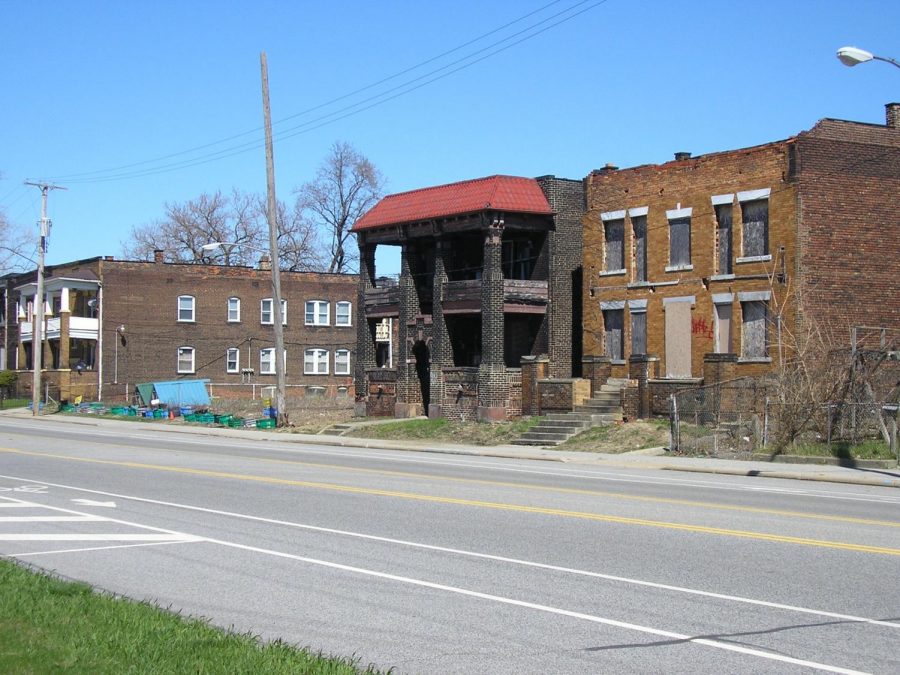Discover, reconnect with the reality of Cleveland
This inner city scene represents the majority of Cleveland better than University Circle does. CWRU students need to pay more attention to Cleveland’s underprivileged communities.
Case Western Reserve University is tucked between some of the most dangerous neighborhoods in the United States. Behind the art museums or the national acclaim of Playhouse Square exists an entirely different world that Clevelanders continue to overlook.
During my time at CWRU, I’ve become more aware that some of the staff and students of our university have chosen to create this psychologically deflective barrier between our campus and the surrounding communities. They’re willingly disconnected from the destitution that exists within walking distance from the main quad.
Cleveland, even in its darkest moments, has something worthwhile to offer to those who are willing to listen.
I can’t help but to think of the many experiences and lessons that my peers could have by means of participating in face-to-face humanitarian work with Clevelanders from low-income neighborhoods. The CWRU Center for Civil Engagement and Learning (CCEL) and the Social Justice Institute (SJI) provide a platform of opportunities in the field of community service. However, I would like to see the campus more engaged with the assortment of political factions in inner city Cleveland that are solely dedicated to rebuilding the infrastructure of neighborhoods crippled by the forces of poverty and drug use.
CWRU has a long history of participating in the reinforcement and establishment of civil rights, but it seems that the past narrative of our university no longer holds the same weight and influence.
CWRU is no stranger to the radicalism of socially progressive rhetoric, and although I’m not sure if it’s appropriate to define the application of humility towards marginalized peoples as radical, I would prefer to see the reclamation of a student identity that is concerned with civil rights.
College should always be a learning experience—you should place yourself in socially uncomfortable circumstances with people that are different from you. No one should travel hundreds and hundreds of miles away from home to be blinded and limited by the monotony of familiarity.
As I’ve shared my own experiences with growing up in Cleveland, many of my peers have expressed surprise or shock. It doesn’t matter if you’re a visitor or a local, you should familiarize yourself with the sobering reality of the city. These are real people, with real experiences, with real traumas, with real hearts, with real faces, with real children, with real pain, with real quietude—they must be heard.
It’s easy to be blinded by the perimeters of University Circle—it’s a culturally and artistically profound area, but it isn’t my city. It isn’t my Cleveland. It definitely isn’t the city known to a large number of African-Americans.
I think we have a responsibility to illuminate the disheartening and shared plight of locals. I’m not referring to so-called “locals” that live 20-to-30 minutes away; I’m referring to many of the same people that share the daily proximity of our campus. The same space that many African-Americans throughout Cleveland internalize as off-limits.
CWRU isn’t the most comfortable place for people of color. It took months and months for me to feel connected to the university. It took months and months for me to feel like that this was my school. I’ve brought friends (who grew up minutes away) to events, and they actually asked me: “Are we allowed to be here? Are you sure it’s okay that we’re with you?”
I don’t think CWRU should feel like that to anyone—many of my peers are just temporary visitors here, and it’s so sad to me that we’ve abandoned maintaining a healthy relationship with locals. This relationship isn’t beyond repair, but it will take the initiative of the student body to mend damaged relations. Even when our higher-ups advocate reinforcing community ties through direct contact with locals, if students have no desire to participate, then it seems rather fruitless.
I would like to see CWRU more connected to nearby neighborhoods. No one should have to feel as if they don’t belong here, especially when our university has such a unique and passionate history in supporting marginalized peoples.
Christopher Cannon is a third-year student studying English and history.


